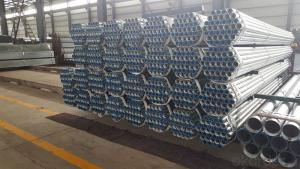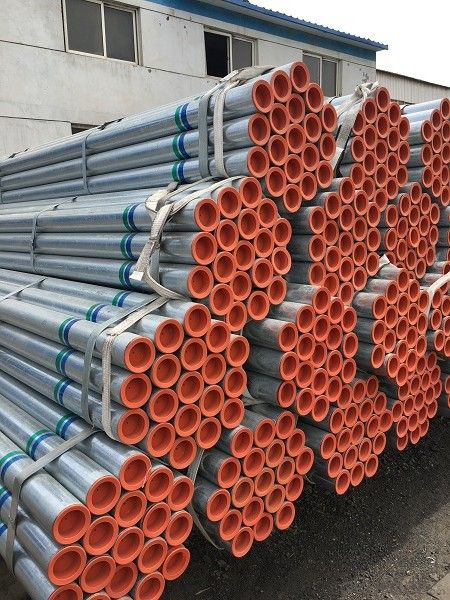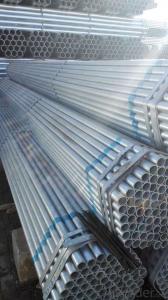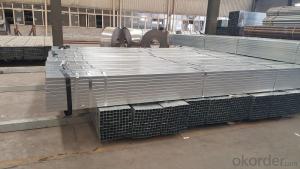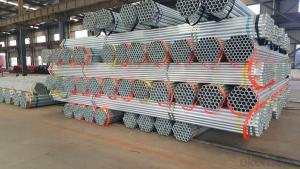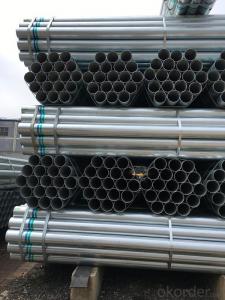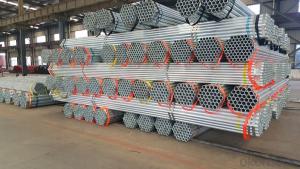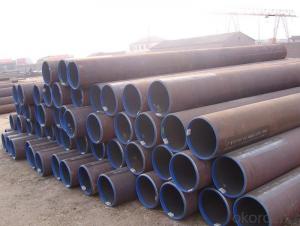Galvanized welded steel pipe for Mechanical Engineering
- Loading Port:
- Tianjin
- Payment Terms:
- TT OR LC
- Min Order Qty:
- 12 m.t.
- Supply Capability:
- 20000 m.t./month
OKorder Service Pledge
OKorder Financial Service
You Might Also Like
Specification
1、Structure of Galvanized welded steel pipe for materials :
The surface of galvanized steel pipe welded steel pipe of hot dip galvanized layer or. Galvanized can increase the corrosion resistance of the steel tube, prolong service life. Galvanized pipe is widely used, in addition to water, gas, oil and other general low pressure fluid pipelines. It is also used in the petroleum industry, especially for offshore oil field of oil well pipe and oil pipe, chemical, coking equipment of oil heater, condensation cooler, coal run oil exchanger tube, and trestle pile, the mine tunnel support frame tube.
2、Main Features of Galvanized welded steel pipe for building materials :
• High manufacturing accuracy
• High strength
• Good visual effect
• Reasonable price
3、 Galvanized welded steel pipe for building materials Specification:
Standard | GB, DIN, ASTM ASTM A106-2006, ASTM A53-2007 |
Grade | 10#-45#, 16Mn 10#, 20#, 45#, 16Mn |
Thickness | 1 - 33 mm |
Section Shape | Round |
Outer Diameter | 21 - 610mm |
Place of Origin | Tianjin, China (Mainland) |
Secondary Or Not | Non-secondary |
Application | Hydraulic Pipe |
Technique | Cold Drawn |
Certification | API |
Surface Treatment | factory state or painted black |
Special Pipe | API Pipe |
Alloy Or Not | Non-alloy |
Length | 5-12M |
Outer Diameter | 21.3-610mm |
Grade | 20#, 45#, Q345, API J55, API K55, API L80, API N80, API P110, A53B |
Standard | ASME, ASTM |
1) Material:Q195 Q235 Q345 X42 X52
2) Specification range:OD:21.3-610mm,WT:6-70mm,length:6-12m or according to the requirement of clients.
3) Excutive standards:GB,ASME API5L.ASTM A 106/A53,Despite of the above standards,we can also supply seamless steel pipe with standard of DIN,JIS,and so on,and also develop new products according to the requirements
4、Packaging & Delivery
Packaging Details: | seaworthy package,bundles wrapped with strong steel strip |
Delivery Detail: | 15-30days after received 30%TT |
5、FAQ of Galvanized welded steel pipe for building materials :
①How is the quality of your products?
Our products are manufactured strictly according to national and internaional standard, and we take a test
on every pipe before delivered out. If you want see our quality certifications and all kinds of testing report, please just ask us for it.
Guaranteed: If products’ quality don’t accord to discription as we give or the promise before you place order, we promise 100% refund.
②How about price?
Yes, we are factory and be able to give you lowest price below market one, and we have a policy that “ for saving time and absolutely honest business attitude, we quote as lowest as possible for any customer, and discount can be given according to quantity”,if you like bargain and factory price is not low enough as you think, just don’t waste your time.Please trust the quotation we would give you, it is professional one.
6、 Galvanized welded steel pipe for building materials Images:
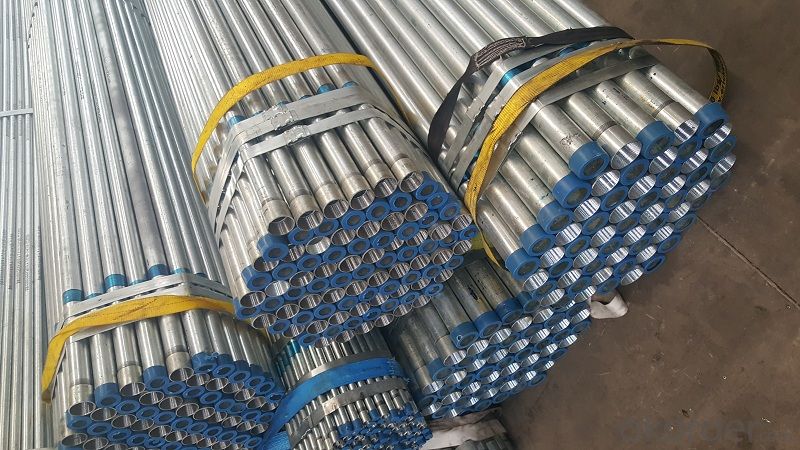
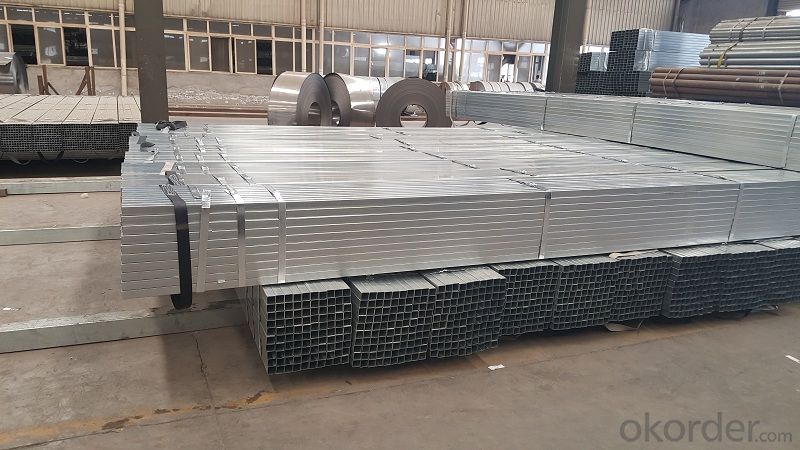
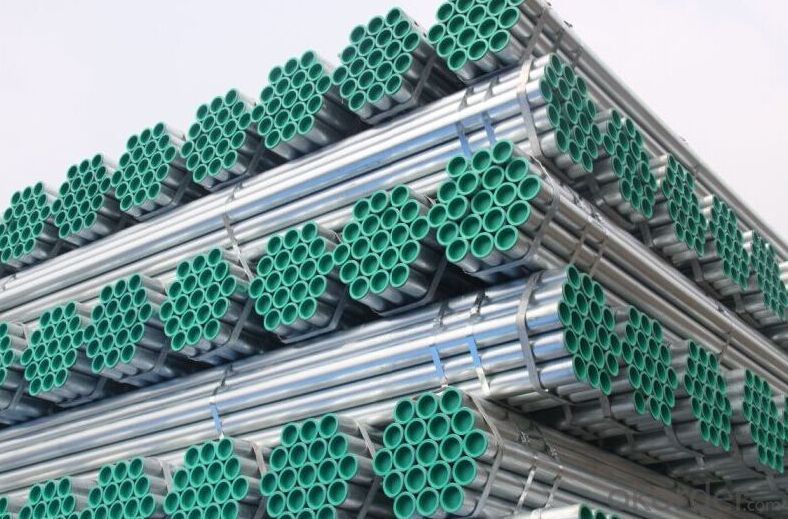
- Q: How many fasteners are there in a ton of steel tubes?
- The fastener generally refers to the intermediate connecting parts connecting two members, in the construction project for external diameter of steel pipe scaffold with 48mm fixation, the fastener is divided into rectangular fastener (cross directional fastener fastener) rotary fastener (universal movable fastener fastener) (a direct docking fastener fastener fastener) etc..
- Q: Can steel pipes be used for underground fuel pipelines?
- Indeed, underground fuel pipelines can utilize steel pipes for their construction. Steel pipes are widely favored for different pipeline applications owing to their exceptional durability, strength, and resistance to corrosion. In the case of underground fuel pipelines, steel pipes are particularly sought-after due to their capacity to endure significant pressure and fluctuations in temperature. Moreover, by shielding against external factors like soil shifts and chemical reactions, steel pipes offer exceptional safeguarding to the fuel transportation system, ensuring its safety and integrity. Through appropriate insulation and coating, the corrosion resistance of steel pipes can be further enhanced, solidifying their dependability as a choice for underground fuel pipelines.
- Q: Are steel pipes resistant to UV radiation?
- No, steel pipes are not inherently resistant to UV radiation. They can be affected by prolonged exposure to UV rays, leading to degradation and potential damage over time.
- Q: What materials are used in scaffolding pipes?
- Using 48.3 * 3.6mm steel pipe, the maximum thickness of the steel pipe shall not be less than 3.24mm (there should be no serious corrosion, bending, flattening or crack); the corrosion depth of the old steel pipe shall be in accordance with the construction fastener typeProvisions on the safety technical specification for steel pipe scaffold JGJ130-2011. Take three of the corroded steel tubes, and cut the samples at the most severe parts of the rust. The corrosion depth shall not exceed the prescribed valueUse。 In addition, the approach of the steel pipe should also be sampling retest, qualified before use.
- Q: What are the quality control measures for steel pipe manufacturing?
- The quality control measures for steel pipe manufacturing typically include various stages of inspection and testing, starting from raw material evaluation to the final product. These measures may include checking the chemical composition and mechanical properties of the steel, conducting non-destructive testing such as ultrasonic or magnetic particle inspection, monitoring the dimensions and surface finish of the pipes, and ensuring compliance with relevant industry standards and specifications. Additionally, quality control measures may involve regular maintenance and calibration of equipment, rigorous documentation and traceability of processes, and continuous monitoring and improvement of manufacturing techniques to meet the desired quality standards.
- Q: How are steel pipes protected against ultraviolet (UV) radiation?
- Coatings or paints can be applied to steel pipes to protect them from ultraviolet (UV) radiation. These coatings are designed to resist the damaging effects of UV radiation, such as fading, chalking, or degradation of the steel. One common method of protection involves using UV-resistant paints or polymeric coatings that contain additives or pigments capable of reflecting or absorbing UV rays. These coatings not only shield the steel from UV radiation but also provide an extra layer of corrosion protection, increasing the pipes' lifespan. Another method used for UV protection is applying thermal insulation materials. These materials, such as foam or coatings with reflective properties, help reduce the impact of UV radiation on the steel pipes. By acting as a shield, they prevent direct exposure to UV rays and minimize potential damage from prolonged exposure. It's essential to consider various factors, including the specific application, environmental conditions, and desired durability of the steel pipes, when choosing a UV protection method. Seeking advice from experts in the field can help determine the most suitable solution for a particular project or application.
- Q: How are steel pipes used in the transportation of fluids?
- Steel pipes are commonly used in the transportation of fluids due to their durability and strength. They are used to carry various types of liquids and gases, such as water, oil, natural gas, and chemicals. Steel pipes are able to withstand high pressure and temperature, making them ideal for long-distance transportation of fluids. They are widely used in industries like oil and gas, water supply, and sewage systems, providing a reliable and efficient means of fluid transportation.
- Q: What is the difference between galvanized iron pipe and galvanized steel pipe? Or called different, in fact, is referred to as galvanized pipe?
- Just name different, all refers to GB/T 3091-2015 "low pressure fluid transport welding pipe" contained in the galvanized pipe.Galvanized pipe means zinc plated, suitable for water, air, heating, steam and gas and other low pressure fluid conveying straight welded steel pipe, longitudinal submerged arc welding (SAWL) steel pipe and spiral seam submerged arc welding (SAWH) steel pipe.
- Q: How do you prevent steel pipes from freezing in cold climates?
- One way to prevent steel pipes from freezing in cold climates is by insulating them with materials such as foam insulation or heat tape. This helps to maintain the temperature of the pipes and prevents them from freezing. Additionally, ensuring that all cracks or openings in the walls or foundation where the pipes are located are sealed can also help in preventing the pipes from freezing.
- Q: Can steel pipes be used for LNG terminals?
- Yes, steel pipes can be used for LNG terminals. Steel pipes are commonly used in the construction of infrastructure for LNG terminals due to their strength, durability, and resistance to extreme temperatures. They can effectively handle the high-pressure requirements and the cryogenic temperatures involved in the storage and transportation of liquefied natural gas.
Send your message to us
Galvanized welded steel pipe for Mechanical Engineering
- Loading Port:
- Tianjin
- Payment Terms:
- TT OR LC
- Min Order Qty:
- 12 m.t.
- Supply Capability:
- 20000 m.t./month
OKorder Service Pledge
OKorder Financial Service
Similar products
Hot products
Hot Searches
Related keywords
